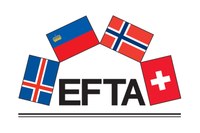 On September 30, EFTA (by the way, do you remember the countries which are still members of the European Free Trade Association? do you know that EFTA was celebrating its 50th birthday in 2010 ? more on EFTA)… EFTA was thus organising a copyright conference at its Brussels HQ on “The Nordic Model – Extended Collective Agreement”. Who would have expected that this rather unappealing topic would attract a large audience? More than hundred people gathered to hear various speakers discussing the merits of the Nordic model.
On September 30, EFTA (by the way, do you remember the countries which are still members of the European Free Trade Association? do you know that EFTA was celebrating its 50th birthday in 2010 ? more on EFTA)… EFTA was thus organising a copyright conference at its Brussels HQ on “The Nordic Model – Extended Collective Agreement”. Who would have expected that this rather unappealing topic would attract a large audience? More than hundred people gathered to hear various speakers discussing the merits of the Nordic model.
The Extended Collective Licence (ECL) model has been devised as a tool to remedy the high transaction costs linked with copyright clearance and the need to obtain the authorisations from various and often numerous right owners. Because of those transaction costs, users often refrain from seeking the required consent or from using the work at all. Such an outcome is not desirable. The ECL model refers “to the situation where a licence agreement freely negotiated between a collective management organisation (CMO) and a user – typically an institution – by legal provision is extended onto the works of right holders who are not members of the CMO” (Christian Rydning, Extended Collective Licences — The compatibility of the Nordic solution with the international conventions and EC law, Norwegian Research Center for Computers And Law, Complex nr. 3/2010, p. 11). It thus differs from a compulsory license because it is not imposed by law, but freely negotiated; however, it requires the force of a statutory provision to extend its scope to those who are not members of the CMO, the “outsiders”. Question: is this model unknown under EU copyright law?
An ECL is thus a strange legal animal whose compatibility with the international copyright rules is still under discussion. But it clearly appears as a practical tool, especially at a time where more and more online uses require a multitude of authorisations. Not surprisingly, the ECL model has been applied to a broadcasters’ archival project (in Denmark) and an online library (in Norway). A few words on the Norwegian online library called “bokhylla”, in English “bookshelf”. Only available in Norwegian (here), this library encompasses about 50.000 copyright-protected books (contrary to other online libraries, it makes available books that are still protected). The value is not in the rather modest number of volumes (however the number may be significant compared to the total number of volumes published in Norwegian), but in the quality of the research tools offered (full-text search, by title, author, word and quotation). This online bookshelf relies on an ECL between the National Library of Norway and Kopinor (a CMO which represents various right holders). Everybody seems to benefit from the experiment: at least, there is an easy access for the users and a reasonable remuneration for the right holders. The use of this online libray seems to verify the theory of the “long tail” (popularized by Chris Anderson) as many old books are often consulted and thus revived. The ECL brings revenues: 0,06 € per year/per page made available is paid to the right owners. However, the system only works within the Norwegian borders (the library cannot offer its online books to users who do not have a Norwegian IP-address). It is thus no surprise that the Norwegian Minister of Culture has decided to push for the adoption of an international treaty that will commit the Nordic countries to mutually recognise each others extended collective agreements on copyright. The Norwegian library will then become accessible in all the Nordic countries. This seems rather attractive and could inspire the EU legislator – unfortunately, we are still far away from a system of mutual recognition of national systems geared at solving the “outsiders” issue. For an online library comprising old books still under copyright, the outsiders’ class covers all the right owners on the orphan titles.
The next question is: in which respects does the model of “bokhylla.no” differ from the online library that everybody has in mind: Google Books? I leave it to all of you to consider this interesting question.
Presentations from the speakers at the EFTA conference now available here.

